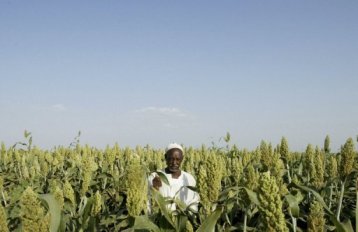Sudanese minister complains about underfunding of agriculture
April 23, 2013 (KHARTOUM) – Sudan’s minister of agriculture and forestry, Abdel Halim al-Mutafi, acknowledged that there is a serious shortage in agricultural finance, saying that last year’s allocated funds did not exceed 2.5 billion pounds (SDG) which represents only 2% of the total loans extended by the banks nationwide.

The Sudanese official further questioned the possibility of achieving self-sufficiency and poverty alleviation, explaining that Sudan’s imports of food products exceed $1 billion, while spending on agricultural activities doesn’t exceed a mere $600 million saying he expects a grain shortage of up to 76 thousand tonnes this year.
The agricultural minister who testified before the parliament yesterday, said that his ministry owesover 50 million SDG to pesticides companies.
Al-Mutafi also defended the experience of genetically modified cotton, saying “It is neither a new experience nor a hellish idea; it has been proven for years in the United States and Asia”. He asserted that production of genetically modified cotton is higher than other types of cotton, noting that Suki and Rahad agricultural schemes decided to only grow modified cotton but that Gezira project decided to grow it in one-third of its total area.
MPs blamed the government for the deterioration of the agricultural sector since the beginning of the 90’s and until today, stressing that farmers are working in difficult conditions and resorting to selling their livestock and jewelry in order to finance their farms.
The parliament’s deputy speaker, Hago Gasm Elsid, expressed his sorrow for the current situation of agriculture in Sudan, saying “We even import tomatoes”.
Once hoped to be the breadbasket of the Arab world, Sudan’s agricultural sector has continued to deteriorate over the years mainly as a result of negligence, drought, mismanagement and the overall economic climate.
Sudanese farmers often complain about the high costs of imported materials such as fertilizers. Many of them were sent to jail as their debt piled up.
Several ambitious plans enacted to bring life to this sector have failed to materialize and critics say the government forfeited a golden opportunity during the oil boom to boost agriculture.
Foreign investors also complain about lack of infrastructure and unfriendly laws which they say deters them from putting money in Sudan’s vast farmlands.
Sudanese officials say that they are refocusing on agriculture as part of the broader economic plan to find alternatives to oil most of which went over to South Sudan following its independence in July 2011.
(ST)
